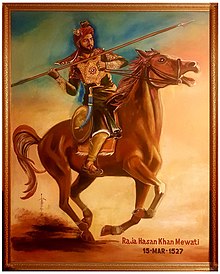For the sovereign kingdom, see Mewat State.
| Hasan Khan Mewati | |||||||||
|---|---|---|---|---|---|---|---|---|---|
| Shaheed, Raja, Wali | |||||||||
 | |||||||||
| 9th Shah-e-Mewat | |||||||||
| Reign | 1504 – 1527 | ||||||||
| Predecessor | Khanzada Alawal Khan | ||||||||
| Successor | Post Abolished Babur (as Mughal Empire) Sher Shah Suri (as Sur Empire) | ||||||||
| Born | Alwar, Mewat (present-day Rajasthan, India) | ||||||||
| Died | (1527-03-16)16 March 1527 Khanwa (present-day Rajasthan, India) | ||||||||
| Burial | Rajasthan, India | ||||||||
| |||||||||
| Hindi | हसन खां मेवाती | ||||||||
| Urdu | حسن خاں میوات | ||||||||
| House | Khanzada Rajputs | ||||||||
| Dynasty | Wali-e-Mewat dynasty | ||||||||
| Father | Khanzada Alawal Khan | ||||||||
| Religion | Sunni Islam | ||||||||
Raja Hasan Khan Mewati (died 17 March 1527) was a Muslim Khanzada Rajput ruler of Mewat. The son of previous ruler Raja Alawal Khan, his dynasty had ruled Mewat State for nearly 200 years. He was a descendant of Raja Nahar Khan Mewati, who was the Wali of Mewat in 14th century.
He was the Rajput chieftain whose ancestors had been ruling the region of Mewat for almost two centuries and had declared himself as a sovereign king. Babur, the founder of the Mughal Empire had stated that Hasan Khan Mewati was the leader of the ‘Mewat country’. He joined the Rajput Confederation with 5,000 allies in the Battle of Khanwa, where he was killed in the battle by Mughal forces led by Babur. He also re-constructed the Alwar fort in 15th century.
Military campaigns
Hasan Khan Mewati played a significant role in two crucial battles: the Battle of Panipat and the Battle of Khanwa.
First battle of Panipat
Main article: First Battle of PanipatHasan Khan Mewati supported Ibrahim Lodi, the Sultan of Delhi, in the first Battle of Panipat, which took place in 1526. This battle was a pivotal conflict between the Mughal Empire, led by Babur, and the Sultanate of Delhi, led by Ibrahim Lodi. In this battle, Babur emerged victorious, and Lodi lost his life. During the conflict, Babur took Hasan Khan Mewati's son as a hostage. Despite the defeat, Hasan Khan Mewati did not yield to the foreign invader. Following the Battle of Panipat, Hasan Khan Mewati aligned himself with Rana Sanga to continue the fight against Babur and the Mughal Empire.
Battle of Khanwa
Main article: Battle of KhanwaThe Battle of Khanwa occurred on March 15, 1527, between Rana Sanga of Mewar and Babur. At this time, Hasan Khan Mewati's patriotism and bravery had earned him a reputation as a fierce warrior. Hasan Khan Mewati, once again, supported Rana Sanga in this battle. When Rana Sanga was struck by an arrow and fell from his elephant, the Mewati king took charge of the commander's flag and led the attack against Babur's forces. Hasan Khan Mewati displayed tremendous valor as he, along with his 12 thousand horse soldiers, fiercely confronted Babur's army. They were initially successful and seemed to be overpowering the Mughal forces. Unfortunately, during the battle, Hasan Khan Mewati was struck by a cannonball that hit his chest. Despite his bravery and resilience, this injury proved fatal, and Hasan Khan Mewati lost his life in the midst of the battle.
References
- "تاریخ میوچھتری | ریختہ". Rekhta (in Urdu). Retrieved 6 June 2022.
- توصیف الحسن میواتی الہندی (23 August 2020). تاریخِ میو اور داستانِ میوات.
- "Tareekh-e-Miyo Chhatri by Hakeem Abdush Shakoor". Rekhta. Retrieved 14 June 2022.
- Chandra, Satish (1 April 1982), "Mughal India", The Cambridge Economic History of India, Cambridge University Press, pp. 458–471, ISBN 978-1-139-05451-5, retrieved 7 November 2023
- "अलवर का वीर देशभक्त सपूत, जिससे बाबर भी घबराता था, बाबर के खिलाफ जमकर किया था युद्ध | Hasan Khan Mewati Alwar Story In Hindi". Patrika News (in Hindi). 18 December 2018. Retrieved 7 November 2023.
Bibliography
- Gopinath Sharma (1954). Mewar & the Mughal Emperors (1526-1707 A.D.). S.L. Agarwala.